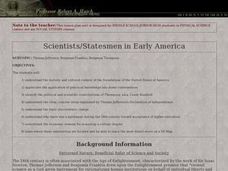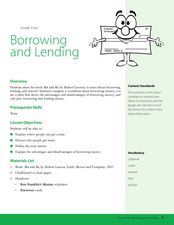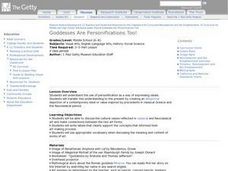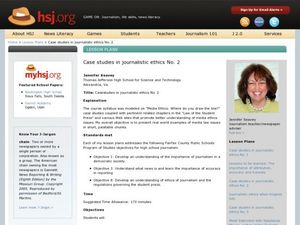Curated OER
Scientists and Statesmen in Early America
Explore the historic and cultural context of the foundations of the United States of America. They identify the political and scientific contributions of early American scientists.
James Madison Memorial Fellowship Foundation
A Deliberate, Palpable and Dangerous Exercise of Other Powers: James Madison & Homeland Security
This resource uses primary source documents to explore the First Amendment. After reviewing key events of the 1790s, government or US history classes explore Madison's letter to Jefferson regarding the Alien and Sedition Acts. They then...
Curated OER
Borrowing and Lending
Fourth graders investigate the advantages and disadvantages of borrowing money. For this financial awareness lesson, 4th graders read the book Ben and Me and create a table displaying the advantages and disadvantages of borrowing money.
Curated OER
A Collage of American Icons: Presidents and Symbols
Students use KWL charts, stores, news, books, and movies to learn about the Presidents and symbols of America. In this Presidents and symbols lesson plan, students participate in many activities that introduce them to the leaders and...
Curated OER
Early America
Students explore what a leader represents. In this social science lesson, students discuss what the traits, qualities, or characteristics are of a leader. Students also understand that leaders existed in America's past and in the present...
Curated OER
George Washington on the Sedition Act
Learners investigate the Sedition Act and George Washington's position on the act. In this United States Colonial history lesson, students read about George Washington's position on the Sedition Act. Learners then participate in a...
Curated OER
Consequences of the Sedition Act
High schoolers research and discuss the consequences of the Sedition Act. They illustrate the difficulty of balancing security needs and personal freedom using an example from John Adams's presidency.
National Endowment for the Humanities
The Monroe Doctrine: A Close Reading
Students identify specific passages in the Monroe Doctrine to events in early U.S. diplomacy.
Curated OER
The Monroe Doctrine: President Monroe and the Independence Movement in South America
Students identify conditions in Europe that relate to the independence movements in South America and list reasons why President Monroe gave for recognizing the independence movement in South America.
Curated OER
Goddesses are Personifications Too!
Students analyze the use of personification in classical Greek art and the Neoclassical period. In this Neoclassical art instructional activity, students discuss the cultural values reflected in classical and Neoclassical....
Curated OER
Earth and Beyond!
Students investigate one or more of the following topics and develop a plan for the future regarding it: global warming, lunar exploration, space travel, Mars exploration, or terraforming. They disucss the audio files and the video that...
Curated OER
Case Studies in Journalistic Ethics No. 2
Learners use texts on media ethics and various Web sites to explore real world examples of media law issues. For this media ethics lesson, students examine the Food Lion case using a transcript from the court of appeals session and...
Curated OER
From the President's Lips: The Concerns that Led to the Sedition (and Alien) Act
Students research and briefly summarize the international situation during John Adams's presidency. They list the concerns that led to the Sedition Act and describe it.
Curated OER
Who's the Father?
Students analyze gels to determine parentage in this lesson about scientific evidence, investigation, and DNA concepts. The lesson includes a pre-activity worksheet, a final individual assessment, and student handouts for in-class...
Curated OER
The Monroe Doctrine: U.S. Foreign Affairs (circa 1782-1823) and James Monroe
High schoolers read the test of the Monroe Doctrine then list the key points and discuss its central tenets.
Curated OER
Presidential Speeches
Listen to and analyze a presidential speech in order to explain the principles held by the president and the historical context in which the speech was made. Then hold a campaign and election simulation involving featured presidents.
Southern Nevada Regional Professional Development Program
Common Core Reading Standards: Understanding Argument
What does your class know about logical fallacies? They can find out quite a bit and practice identifying logical fallacies if you follow the steps and use the resources provided here! After reviewing ethos, pathos, and logos, ask small...
Curated OER
Civil War
Students explore rules of conduct in a political body, first drafting rules that apply to their classroom, then adapting them to political actions in Congress.
Curated OER
Grade 8 Unit 4
Eighth graders analyze aspirations and ideals of the people of the new nation, in terms of its physical landscapes and political divisions, and the territorial expansion of the United States during the terms of the first four presidents.
Curated OER
Government
High schoolers evaluate how the United States government has maintained a balance between protecting rights and maintaining order. They analyze the impact of Supreme Court decisions on governmental powers and the rights and...





















